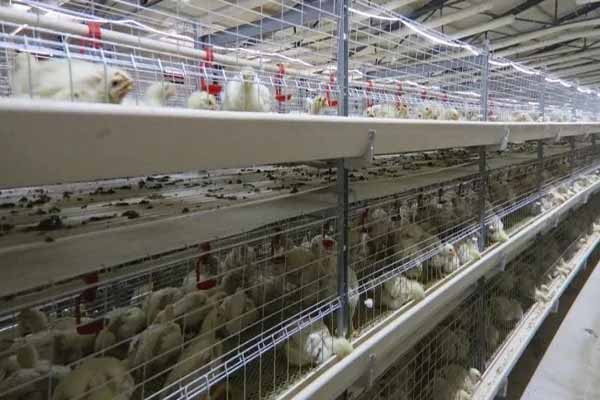Exploring Different Types of Chicken Broiler Cages
Time : 2025-04-16
When it comes to raising chickens for broiler production, selecting the right type of cage is crucial for the health, welfare, and productivity of the birds. There are several types of chicken broiler cages available in the market, each with its own set of advantages and disadvantages. In this article, we’ll dive into the various types of chicken broiler cages to help you make an informed decision for your farm.
1. Wire Cages
Wire cages are perhaps the most common type of broiler cage. They are made from metal wires and are designed to house broiler chickens. Here are some key features of wire cages:
– Cost-Effective: Wire cages are generally less expensive than other types of cages.
– Easy to Clean: The wire design allows for easy cleaning, which is important for maintaining hygiene.
– Ventilation: The wire provides excellent ventilation, ensuring that the chickens stay cool.
– Space Efficiency: Wire cages are space-efficient, making them suitable for large-scale poultry operations.
However, there are some drawbacks to consider:
– Chickens can Escape: Sometimes, the gaps between the wires can be large enough for chickens to escape.
– Wear and Tear: Over time, the wires can become rusty and weak, leading to potential damage.
2. Plastic Cages
Plastic cages are becoming increasingly popular due to their unique features:
– Hygiene: Plastic cages are easier to clean than wire cages, reducing the risk of disease.
– Comfort: The smooth surface of the plastic prevents skin injuries to the chickens.
– Insulation: Plastic provides better insulation, which can be beneficial in extreme weather conditions.
On the downside:
– Cost: Plastic cages can be more expensive than wire cages.
– Durability: While durable, plastic cages may not last as long as wire cages if not properly maintained.
3. Wooden Cages
Wooden cages are a good choice for small-scale poultry operations:
– Natural Insulation: Wood is a natural insulator, which can be advantageous in varying weather conditions.
– Comfort: Wooden cages offer a softer environment for the chickens, reducing the risk of injury.
– Atmospheric: Wooden cages create a more natural atmosphere for the chickens.
However, there are some challenges:
– Maintenance: Wood requires regular maintenance to prevent rot and decay.
– Space: Wooden cages can take up more space than wire or plastic cages.
4. Modular Cages
Modular cages are a newer technology that allows for easy reconfiguration:
– Flexibility: These cages can be adapted to fit various needs, such as changing the size of the cage or adjusting the layout.
– Ease of Maintenance: Modular cages are designed for easy cleaning and maintenance.
– Space Efficiency: They can be placed close together, making them space-efficient.
The main drawbacks include:
– Initial Cost: Modular cages can be expensive to purchase and install.
– Complexity: The design and installation process can be complex, requiring professional expertise.
5. Automated Cages
Automated cages are state-of-the-art and offer numerous benefits:
– Efficiency: Automation can improve the efficiency of the broiler production process.
– Health Monitoring: Automated systems can monitor the health of the chickens, ensuring they are thriving.
– Feeding and Watering: Some automated cages include automated feeding and watering systems.
However, there are some considerations:
– Cost: Automated cages can be quite expensive.
– Technical Knowledge: Operators need to have a good understanding of the technology.
Conclusion
Choosing the right type of chicken broiler cage depends on your specific needs, budget, and the scale of your operation. Each type of cage has its own set of benefits and drawbacks, so it’s important to do your research and consider all factors before making a decision.
Remember, the health and welfare of your chickens should always be your top priority. By selecting the right type of cage, you can ensure that your broiler chickens are comfortable, healthy, and productive.












